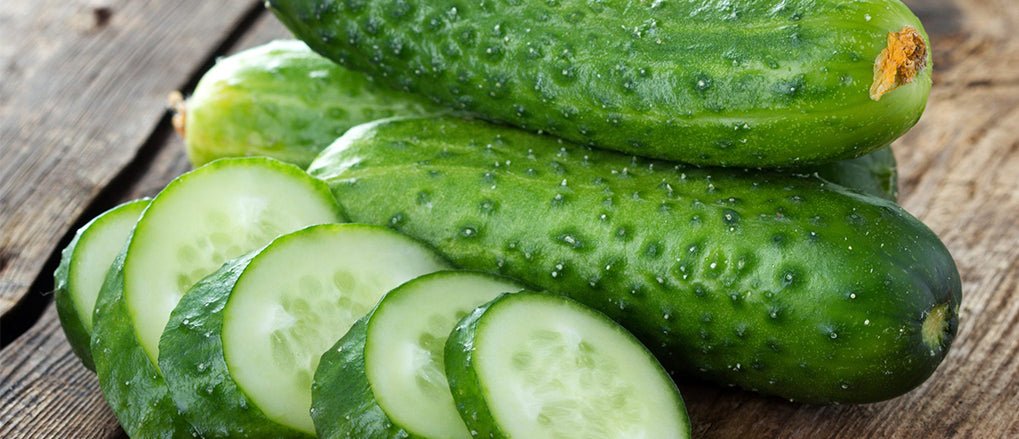
Cucumbers are widely recognized as a refreshing and nutritious vegetable, often found in salads, sandwiches, and juices. They belong to the Cucurbitaceae family, which also includes pumpkins, melons, and squashes.
Cucumbers are available year-round in many parts of the world, making them a staple in diets across the globe. Not only are cucumbers low in calories and hydrating, but they also provide a variety of essential nutrients that can contribute to overall health.
This article explores the general information about cucumbers, their nutritional value, and their versatility as both a food and a natural remedy.
1. What Are Cucumbers?
Cucumbers are elongated, cylindrical fruits with a firm, green outer skin and a pale, watery interior. Botanically classified as fruits because they contain seeds and develop from the flower of the cucumber plant, cucumbers are often treated as vegetables in culinary applications.
There are different varieties of cucumbers, including slicing cucumbers, which are typically eaten raw in salads, and pickling cucumbers, which are smaller and used to make pickles.
Cucumbers are also available in different colors, with the most common being green, although yellow and white varieties can be found in certain regions.
2. Nutritional Value of Cucumbers
Cucumbers are known for their high water content, which makes them an excellent hydrating food. In fact, cucumbers are composed of about 95% water, making them perfect for hydration and helping to maintain electrolyte balance.
Despite being low in calories, cucumbers contain essential nutrients that promote health.
They are a good source of vitamins and minerals, including vitamin K, vitamin C, potassium, and magnesium.
Vitamin K plays a key role in blood clotting and bone health, while potassium helps maintain healthy blood pressure levels. Cucumbers also contain antioxidants, such as beta-carotene and flavonoids, which help neutralize free radicals and reduce inflammation in the body.
3. Health Benefits of Cucumbers
Consuming cucumbers regularly can provide several health benefits. One of the primary benefits is their ability to aid in hydration.
Due to their high water content, cucumbers can help replenish fluids lost during physical activity or hot weather. Proper hydration supports kidney function, digestive health, and healthy skin.
Cucumbers are also rich in antioxidants that can protect the body from oxidative stress. Regular consumption may help reduce the risk of chronic diseases such as heart disease, diabetes, and certain cancers.
Additionally, cucumbers contain fiber, which supports digestive health by promoting regular bowel movements and preventing constipation.
4. Culinary Uses of Cucumbers
Cucumbers are incredibly versatile in the kitchen. They can be eaten raw, pickled, or cooked, making them suitable for a wide range of dishes.
In salads, cucumbers provide a cool, crisp texture that complements other fresh vegetables. They can also be sliced and added to sandwiches, wraps, or burgers for an extra crunch.
Pickled cucumbers, or gherkins, are a popular snack and a staple in many cuisines, particularly in the United States and Europe. The pickling process preserves cucumbers and imparts a tangy flavor, which makes them ideal for adding to salads, burgers, and charcuterie boards.
In some cultures, cucumbers are even used in soups, stews, and stir-fries, although they are more commonly served raw.
5. Growing Cucumbers
Cucumbers thrive in warm, sunny climates and are typically grown as annual crops. They require rich, well-drained soil and ample water to grow. Cucumbers can be grown in gardens, greenhouses, or even containers, making them suitable for a variety of growing environments.
The cucumber plant is a climbing vine that produces flowers, which eventually develop into the cucumbers we consume.
Depending on the variety, cucumbers typically take between 50 and 70 days to mature after planting. The fruit is usually harvested when it reaches a desirable size, and it is best consumed while it is still firm and fresh.
Cucumbers are relatively easy to grow, making them a popular choice for home gardeners. With proper care, they can yield abundant crops, providing fresh produce for the summer months.
Cucumbers are more than just a refreshing food; they are a nutritious and versatile vegetable with a wide range of culinary uses. Packed with water, vitamins, and antioxidants, cucumbers contribute to overall health by promoting hydration, supporting digestion, and offering protection against chronic diseases.
Whether eaten raw in salads, pickled for snacks, or added to cooked dishes, cucumbers are a valuable addition to a healthy diet.
Read Also: How to Store Cucumbers





